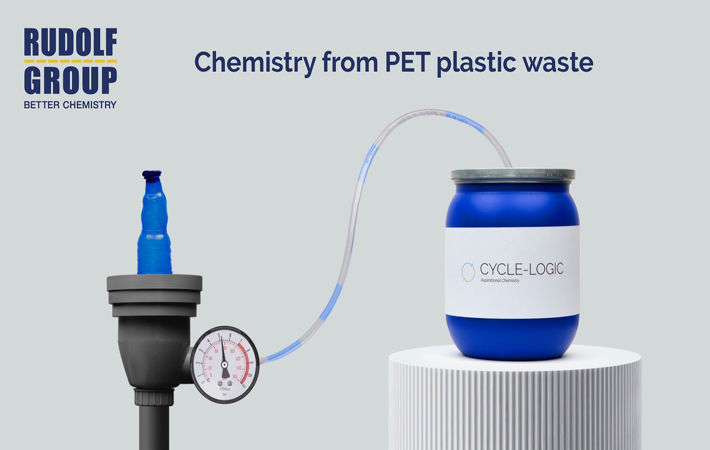Rudolf's Cycle-Logic chemical auxiliaries from recycled PET bottles

The new chemical auxiliaries are Feran Upcycle ICT: the first intelligent moisture management technology for PES textiles; Rucogen Upcycle RNB: most advanced dispersing agent for indigo washing; and Rucolin Upcycle SDS: first, all-in-one, multi-functional, high-affinity polymer dyeing auxiliary, Rudolf said in a press release.
One of the most advanced and progressive frontiers of textile chemistry is the transformation of waste into materials that can be further used for a greener and sustainable world. The majority of the research work in this area concerns organic waste which can be upcycled into bio-carbon based innovation. Cycle-Logic captures tremendous technical innovation and pioneers a new path: the upcycling of post-consumer, disposable and non-returnable plastics, such as beverage PET plastic bottles, into valuable textile chemistry.
Glass, metal and plastic can also be recycled and given a new life, but while glass and metal are nearly infinitely recyclable, plastic is a very different and much more challenging story. Solving this challenge and building a more circular economy for plastics requires innovation and joint efforts throughout the supply chain.
Polyethylene terephthalate, or PET, is the most commonly produced plastic and it has many properties that make it an extremely useful material. Plastic bottles are what first comes to mind when mentioning PET. However, while there’s a constant increase in the demand for plastic bottles (more than 1 million plastic bottles are purchased around the globe every minute), the majority of globally produced PET is still used for clothing. Out of the 30.3 million tons of PET produced in 2017, up to 60 per cent was processed to synthetic fibres and only the remaining 30 per cent was used for the production of bottles, according to Rudolf.
Chemical recycling is the chemical depolymerisation (or breaking down) of plastic polymers into their basic building blocks which are then used to make other, different substances and materials. Through the chemical recycling of PET, Rudolf R&D has studied new options which are additional to the traditional bottle-to-bottle recycling. PET plastics can now be recycled to raw materials used as inputs in Rudolf’s manufacturing and therefore partially replacing fossil resources.
Markets and society expect the industry to come up with innovative and constructive solutions to deal with plastic waste that can be complementary to the existing recycling and waste management processes. In order to meet those expectations, Rudolf introduces manufacturing practices and product propositions that position polyester waste as a precious resource rather than an environmental threat.
Fibre2Fashion News Desk (GK)
































-Ltd..jpg?tr=w-120,h-60,c-at_max,cm-pad_resize,bg-ffffff)





.jpg?tr=w-120,h-60,c-at_max,cm-pad_resize,bg-ffffff)
.jpg?tr=w-120,h-60,c-at_max,cm-pad_resize,bg-ffffff)






